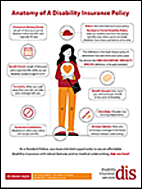Income Protection
You buy insurance for you car, your house, your health and even your life. But what about your income? Income protection is important for anyone who depends on an income – and that’s the vast majority of working adults.
Many different conditions can lead to disability: cancer, heart disease, stroke, depression, injuries, severe back conditions… The list goes on and on.
Plus, many of these disabling conditions are common. The Social Security Administration says that one in four Americans will become disabled before reaching retirement age. Unfortunately, many people don’t make plans for this possibility.
Think about what happens when people get sick. If they have health insurance, their coverage will help pay for their doctor’s appointments, medical tests, and prescription drugs. However, health insurance won’t pay for everything. Many people have significant out-of-pocket costs and out-of-network fees. When you’re dealing with a critical illness, these medical expenses can eat through your savings fast.
At the same time, a person experiencing a major health crisis may not be able to work. Between receiving treatment and dealing with the condition itself, it might not be possible to continue working. Sick pay often only covers a few days and medical insurance doesn’t help pay for lost income. However, income protection is available.


Income Protection
You buy insurance for you car, your house, your health and even your life. But what about your income? Income protection is important for anyone who depends on an income – and that’s the vast majority of working adults.
Many different conditions can lead to disability: cancer, heart disease, stroke, depression, injuries, severe back conditions… The list goes on and on.
Plus, many of these disabling conditions are common. The Social Security Administration says that one in four Americans will become disabled before reaching retirement age. Unfortunately, many people don’t make plans for this possibility.
Think about what happens when people get sick. If they have health insurance, their coverage will help pay for their doctor’s appointments, medical tests, and prescription drugs. However, health insurance won’t pay for everything. Many people have significant out-of-pocket costs and out-of-network fees. When you’re dealing with a critical illness, these medical expenses can eat through your savings fast.
At the same time, a person experiencing a major health crisis may not be able to work. Between receiving treatment and dealing with the condition itself, it might not be possible to continue working. Sick pay often only covers a few days and medical insurance doesn’t help pay for lost income. However, income protection is available.
Income Disruption Can Be Disastrous
When people are living paycheck to paycheck or when they have a limited amount of savings, any income disruption can be disastrous.
According to the Lending Club, 66 percent of Americans are living paycheck to paycheck as of June 2022. Even among high income earners, it’s common to live paycheck to paycheck. For example, 52 percent of people earning between $100,000 and $150,000 say that they live paycheck to paycheck. Some people have savings, but the average savings amount is only $10,757.
Obviously, people who are living paycheck to paycheck can’t afford any disruptions to their income. Having 10 grand in the bank may help them feel more secure. Certainly, this amount could get someone through a variety of difficult situations – for example, an unexpected car breakdown or layoff. However, in the case of a long-term disability, most people would blow through this amount fast.
What About Workers’ Compensation?
In most states, the majority of employers are required to provide workers’ compensation insurance. This means if you are injured on the job, you should be able to apply for workers’ compensation benefits.
However, there are a few caveats.
Firstly, some people don’t have access to workers’ compensation. For example, if you’re self-employed, you probably don’t have coverage.
Secondly, workers’ compensation only applies to work-related illnesses or injuries. What if you’re injured in a car crash? What if you hurt yourself on a skiing trip? What if you develop cancer, heart disease, or another chronic condition that has nothing to do with your job?
Many illnesses and injuries are unrelated to work, meaning workers’ compensation won’t provide coverage. You need income protection in the form of private disability insurance.
Don’t Take Your Income for Granted
If you’re healthy now, you may have a difficult time imagining this could change. Most people don’t want to think about things like disability. That’s understandable, but the reality is that disability can happen to anyone. It’s important to plan for the possibility of an illness or injury that prevents you from working.
Think about how long you could continue to make ends meet if you had to stop working.
· What would happen after three months with no income? Would you have any savings left?
· What would happen after six months? Would you be able to pay your bills?
· And after a year? Would you be able to make mortgage or rent payments to keep your home?
A person’s income is the basis of his or her financial security. Given this, it makes sense to protect that income. People often overlook paycheck protection, but it should be a key part of financial planning.
What Is Income Protection?
Income protection is also called paycheck protection or disability insurance. It’s insurance coverage that replaces a portion of the policyholder’s regular income if the policyholder is unable to work due to a qualifying disability.
Disability insurance monthly benefits can help people cover expenses and keep their heads above water while they’re dealing with a physical health or mental health issue that prevents them from working. Policyholders can use the money however they see fit – for example, to pay mortgage bills or monthly rent, buy groceries and other basic necessities, or pay utilities and other bills that don’t stop just because a person is unable to work due to a serious illness or injury.

Your Income Protection Insurance Options
Most income earners need paycheck protection – but many don’t have it. That’s the bad news. The good news is you have several income protection insurance options:
- Job-Based Short-Term Disability Insurance – This is coverage that workers can receive through their job. If their employer doesn’t cover the full cost, they have to pay a premium, often deducted directly from their paychecks. Short-term coverage is designed to last for short, temporary periods of disability, with a maximum benefit period of around six months. Pros: This coverage is often convenient and affordable. It provides some protection for disabilities that are not expected to persist for a long time. Cons: This coverage does not provide suitable protection against longer lasting or permanent disabilities. Also, workers may lose coverage when they switch jobs.
- Job-Based Long-term Disability Insurance – As with short-term disability insurance, employers offer this type of coverage and may deduct premiums from the worker’s paycheck. However, long-term coverage has a longer maximum benefit period. The elimination period – that’s how long the policyholder has to wait before receiving monthly benefits – is also longer, often around 90 days. Pros: This coverage is often convenient and affordable. It provides some protection for disabilities that last for more than a few months. Cons: Workers may lose coverage when they switch jobs. Plus, the benefit amount may only replace around 60 percent of the person’s income – and since benefits are usually taxable, this amount will be further reduced. Lastly, workers may not be able to customize coverage to meet their needs.
- Social Security Disability Insurance – This is a federal program that provides monthly benefits to individuals with qualifying disabilities. Pros: Workers have to pay Social Security taxes, but, as these are normally deducted from their paychecks anyway, they are already paying for coverage. Cons: This program is a last resort safety net for totally disabled workers – many people overestimate how much it might help them. The monthly benefits are modest: barely enough to keep people above the poverty level. It’s also difficult to qualify for coverage – the majority of applicants are denied, even after appeal, and the appeal process can stretch on for months.
- Individual Disability Insurance – This is disability income insurance people can buy on their own, usually with the help of an insurance broker or independent financial adviser. As multiple different disability insurance companies sell disability income policies, individuals can shop around for the best disability insurance company for their needs. Pros: Individual disability insurance is fully portable. This means workers can keep their coverage if they leave their jobs, even if they decide to become self-employed. Additionally, coverage is fully customizable. Workers can select the riders, definition of disability, renewal provisions, benefit period, elimination period, and amount of coverage that fits their needs. Cons: The main objection is the price. A typical policy costs around 1 to 3 percent of a person’s salary. That can seem like a lot, but when you consider that disability insurance protects your most valuable asset – your income – it’s clear this can be a good deal. People who can’t afford an expensive policy with all the bells and whistles should consider purchasing a basic policy that provides enough coverage to help make ends meet during a disability.
- A Combination of Coverages – Disability insurance isn’t a matter of either/or, as one person can have multiple policies. For example, someone might have access to long-term and short-term disability insurance through work at a great price. Accepting this coverage can be a great way to secure some protection, but since it might not provide enough income replacement, the worker may still need to buy individual disability insurance.
What should you look for in an income protection policy?
As income protection policies can vary greatly, it’s important to compare your options carefully.
1. Is the policy portable? Individual disability insurance policies are, but job-based benefits are usually tied to the job.
2. What is the coverage amount? If you experience a disability, the monthly benefit amount will make a big difference to your finances. Look at the percentage of income that the policy replace. For high income earners, it’s also important to consider whether the monthly benefit cap means you’ll receive less. Finally, consider whether the policy includes provisions to increase the benefit amount as your wages increase.
3. What is the elimination period? Also called the waiting period, this is how long you’ll have to wait after experiencing a disability before you can claim benefits.
4. What is the benefit period? This is how long you can continue receiving benefits. Even with long-term and individual disability insurance policies, some benefit periods only last around two years, although others last for five years, 10 years, or even until the policyholder reaches retirement age.
5. What is the definition of disability? Since the definition of disability will determine whether you qualify for benefits, this is extremely important. In disability insurance policies, disability is typically defined based on whether you can work. Some policies use an any-occupation definition, whereas others use an own-occupation definition. Also check excluded conditions. For example, does the policy cover disabilities caused by mental health conditions?
6. What is the renewal provision? Policies may be non-cancelable or guaranteed renewable.
7. What riders are available? Riders can provide additional benefits. Although riders can also increase the cost of a policy, the extra expense may be worth it for the right rider. For example, a person with substantial student loan debt may want a student loan rider, but someone who is worried about inflation may want a cost-of-living-adjustment rider.
Can people with pre-existing medical conditions secure disability insurance?
People with pre-existing medical conditions or a family medical history may be charged more or denied coverage. However, there are still coverage options available to people with a history of medical issues. Guaranteed standard issue disability insurance may be a good option.
Where can you buy income protection insurance?
· If you’re an individual looking for income protection, an insurance agent can help you find coverage.
· If you’re an agent looking for coverage for a client, you can use the DIS Quote Engine.
Do you need help securing income protection for your clients? DIS can Help.



